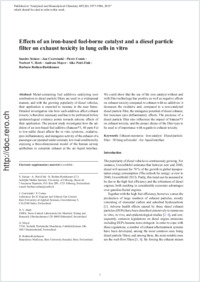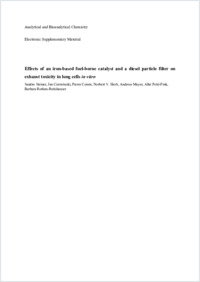Effects of an iron-based fuel-borne catalyst and a diesel particle filter on exhaust toxicity in lung cells in vitro
- Steiner, Sandro Adolphe Merkle Institute, University of Fribourg, Switzerland
- Czerwinski, Jan Laboratory for IC-Engines and Exhaust Gas Control, Bern University of Applied Sciences, Switzerland
- Comte, Pierre Laboratory for IC-Engines and Exhaust Gas Control, Bern University of Applied Sciences, Switzerland
- Heeb, Norbert V. EMPA, Swiss Federal Laboratories for Materials Testing and Research, Dubendorf, Switzerland
- Mayer, Andreas TTM, Technik Thermische Maschinen, Niederrohrdorf, Switzerland
- Petri-Fink, Alke Adolphe Merkle Institute, University of Fribourg, Switzerland
- Rothen-Rutishauser, Barbara Adolphe Merkle Institute, University of Fribourg, Switzerland - Respiratory Medicine, Bern University Hospital, Switzerland
-
01.06.2014
Published in:
- Analytical and Bioanalytical Chemistry. - 2015, vol. 407, no. 20, p. 5977–5986
English
Metal-containing fuel additives catalyzing soot combustion in diesel particle filters are used in a widespread manner, and with the growing popularity of diesel vehicles, their application is expected to increase in the near future. Detailed investigation into how such additives affect exhaust toxicity is therefore necessary and has to be performed before epidemiological evidence points towards adverse effects of their application. The present study investigates how the addition of an iron-based fuel additive (Satacen®3, 40 ppm Fe) to low-sulfur diesel affects the in vitro cytotoxic, oxidative, (pro-)inflammatory, and mutagenic activity of the exhaust of a passenger car operated under constant, low-load conditions by exposing a three-dimensional model of the human airway epithelium to complete exhaust at the air–liquid interface. We could show that the use of the iron catalyst without and with filter technology has positive as well as negative effects on exhaust toxicity compared to exhaust with no additives: it decreases the oxidative and, compared to a non-catalyzed diesel particle filter, the mutagenic potential of diesel exhaust, but increases (pro-)inflammatory effects. The presence of a diesel particle filter also influences the impact of Satacen®3 on exhaust toxicity, and the proper choice of the filter type to be used is of importance with regards to exhaust toxicity.
- Faculty
- Faculté des sciences et de médecine
- Department
- Département de Chimie
- Language
-
- English
- Classification
- Chemistry
- License
- License undefined
- Identifiers
-
- RERO DOC 257152
- DOI 10.1007/s00216-014-7878-5
- Persistent URL
- https://folia.unifr.ch/unifr/documents/304502
Other files
Statistics
Document views: 59
File downloads:
- fin_eib.pdf: 166
- fin_eib_sm.pdf: 101

